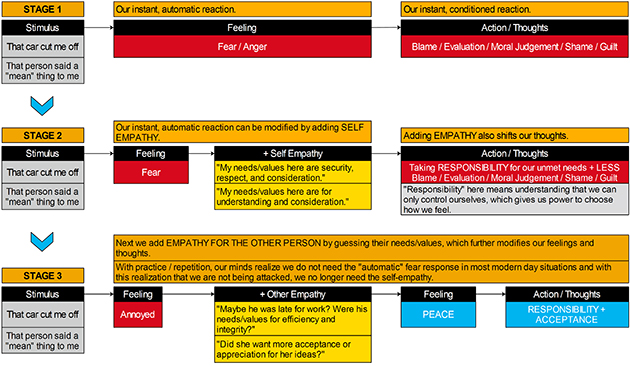|
by Scott Swain What if we have more power over our own emotions than we thought? How much can we reprogram ourselves? When we see a car has cut us off or a person saying a "mean" thing to us, we have an instant, automatic feeling in our body. This is an important defense mechanism that can serve to save our lives when we are in physical danger. Sometimes. Other times, it might serve us better to not be drawn into our "lizard brain". It is possible to train ourselves, over time, to have more control over our own thoughts, and eventually, even the "automatic" feelings that occur when our senses are stimulated. The process is actually quite simple but can take quite a bit of practice to master.  Click the chart on the right to see a larger visual representation of the three stages I describe below. At STAGE 1 we react automatically. We may withdraw, dodge, become defensive, or attack. We are allowing our fear and/or anger to rule us. We may even blame the other person for saying or doing the "wrong" thing. STAGE 2 comes when we begin to take responsibility for not just our reactions, but also our feelings. How? By asking ourselves, "What needs or values of mine are not being met when this thing happens?" Let's call this "self empathy". The thought process: That person called me a thing I don't like. I wanted more understanding and consideration. After practicing that self empathy, at some point we can move to STAGE 3 where we ask ourselves, "What might be going on for that other person to motivate them to say such a thing?" This is empathy for the other person. The thought process: That person called me a thing I don't like. Why? Maybe she lashed out because she wanted more acceptance or appreciation for her ideas? With the practice/repetition of pausing to re-characterize similar situations as not being an attack, eventually, we react less and less often to harmless stimuli in a defensive manner. And the more we see ourselves reacting with peaceful curiosity to more situations, we appreciate the power that comes with knowing we are in control of all aspects of how we process stimuli. To put it simply: We are merely teaching our brain: Let's not react defensively when we are not in danger. | "I want to take my time: to come from an energy I choose rather than one I've been programmed to come from." - Marshall B. Rosenberg |
|